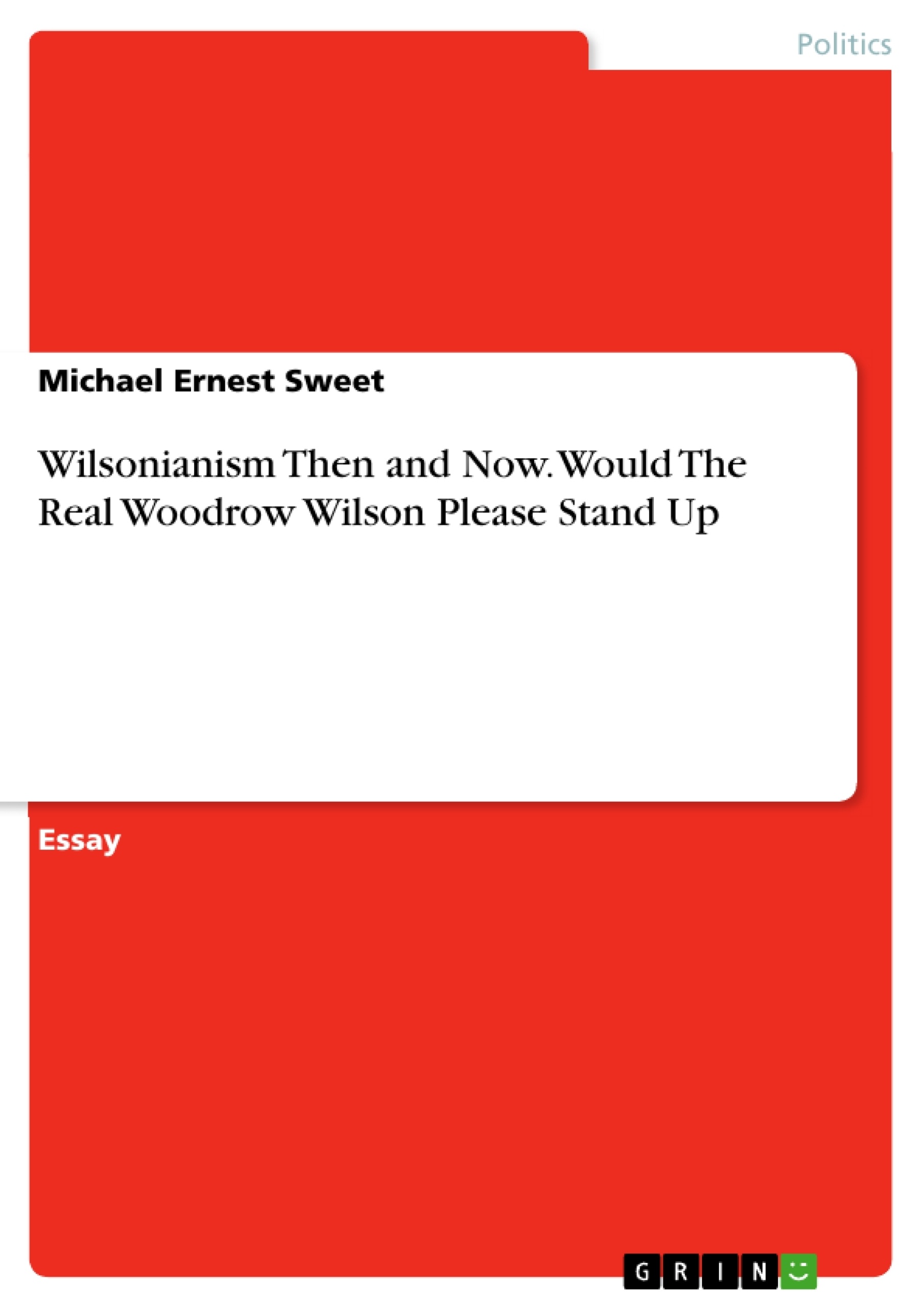In this paper, Canadian writer and educator, Michael Ernest Sweet, explores the topic of Woodrow Wilson, the 28th president of the United States of America. The paper seeks to uncover Wilson's thought, his influences (with a detailed look at Hegel's influence) and his impact on American government then and now.
Additionally, his legacy is examined in terms of what he actually inspired in American political science, and what he is often, wrongly, attributed to him and his administration. Both foreign and domestic policy is considered. The paper concludes that Wilson's legacy is, most correctly, that he opened the American mind toward a new political era - an era that is not fixed and static like that of the founding and its confining Constitutionalism, but rather one with an eye toward the inevitability of progress in history and, ultimately, a new freedom.
Inhaltsverzeichnis (Table of Contents)
- I. Introduction
- II. Wilson's Progressivism
Zielsetzung und Themenschwerpunkte (Objectives and Key Themes)
This paper aims to illuminate Woodrow Wilson's thought and legacy within the context of 21st-century American politics. It examines the various interpretations of Wilson, ranging from "boogeyman" to "savior of humanity," seeking to understand the intellectual influences on his ideas and assessing his lasting impact. The paper also investigates whether Wilson's actions benefited American society or led to political incoherence.
- Woodrow Wilson's rejection of the founding principles of the United States.
- The influence of Hegelian Idealism on Wilson's progressivism.
- The tension between Wilson's progressive policies and the constraints of constitutionally limited government.
- Wilson's legacy and its implications for contemporary American politics.
- The compatibility (or lack thereof) of progressivism and constitutionally limited government.
Zusammenfassung der Kapitel (Chapter Summaries)
I. Introduction: This introductory chapter establishes the context for examining Woodrow Wilson's presidency and its lasting impact on American politics. It introduces the contrasting views of Wilson as a progressive reformer and a threat to limited government, highlighting the complexities of his legacy. The chapter emphasizes Wilson's unique position as a political scientist who became president, influencing both the theoretical and practical aspects of American governance. It sets the stage for a nuanced examination of Wilson's thought and actions, exploring whether his policies ultimately benefited or harmed American society. The chapter also touches upon the enduring relevance of the questions Wilson's presidency raises about the balance between progress and constitutional constraints.
II. Wilson's Progressivism: This chapter delves into the core of Wilson's progressive ideology, focusing on his conscious rejection of the founding principles of the United States. It explores Wilson's belief that the founding principles were context-specific and required adaptation to changing historical circumstances. The chapter contrasts this perspective with the founders' belief in fixed human nature and the need for a stable constitutional framework. It examines the influence of Hegelian Idealism, particularly through the work of Edward Caird, on Wilson's ability to reconcile seemingly opposing views of conservatism and progressivism. The chapter highlights the unique nature of Wilson's progressivism and explores the challenges of assessing the impact of one individual's ideas on the course of history. The chapter also directly addresses the question of whether Wilson intentionally sought to reform the Constitution, either on paper or in practice, to implement his progressive vision.
Schlüsselwörter (Keywords)
Woodrow Wilson, Progressivism, Hegelianism, Constitutionalism, Limited Government, American Politics, Political Science, Historical Context, Progressive Liberalism, Constitutional Reform.
Frequently Asked Questions: A Comprehensive Language Preview of Woodrow Wilson's Progressivism
What is the purpose of this paper?
This paper aims to analyze Woodrow Wilson's thought and legacy within the context of 21st-century American politics. It explores diverse interpretations of Wilson, examining the intellectual influences on his ideas and assessing his lasting impact on American society. A key focus is on whether Wilson's actions benefited American society or led to political incoherence.
What are the key themes explored in this paper?
The paper investigates several key themes, including Woodrow Wilson's rejection of the founding principles of the United States; the influence of Hegelian Idealism on his progressivism; the tension between his progressive policies and the constraints of constitutionally limited government; Wilson's legacy and its implications for contemporary American politics; and the compatibility (or lack thereof) of progressivism and constitutionally limited government.
What does the introduction chapter cover?
The introduction sets the stage by establishing the context for examining Woodrow Wilson's presidency and its lasting impact. It presents contrasting views of Wilson, highlighting the complexities of his legacy and emphasizing his unique position as a political scientist who became president. It sets the stage for a nuanced examination of his thought and actions, exploring whether his policies ultimately benefited or harmed American society, and touches upon the enduring relevance of the questions his presidency raises.
What is the focus of the chapter on Wilson's Progressivism?
This chapter delves into the core of Wilson's progressive ideology, emphasizing his rejection of the founding principles of the United States. It explores his belief that these principles required adaptation to changing circumstances, contrasting this with the founders' views. It examines the influence of Hegelian Idealism on his thinking, highlighting the unique nature of his progressivism and addressing whether he intentionally sought to reform the Constitution to implement his vision.
What are the key terms associated with this analysis?
Key terms include Woodrow Wilson, Progressivism, Hegelianism, Constitutionalism, Limited Government, American Politics, Political Science, Historical Context, Progressive Liberalism, and Constitutional Reform.
What is included in this language preview?
This preview provides a comprehensive overview, including the title, table of contents, objectives and key themes, chapter summaries, and keywords.
- Arbeit zitieren
- Michael Ernest Sweet (Autor:in), 2016, Wilsonianism Then and Now. Would The Real Woodrow Wilson Please Stand Up, München, GRIN Verlag, https://www.grin.com/document/350695



